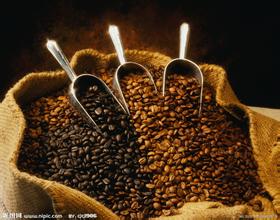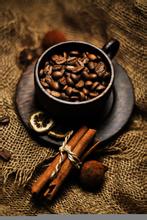Flavor description of Rosa Coffee with Honey Cream Flavor introduction to the characteristics of Grinding degree and characteristics of varieties
The dry aroma of Rosa is very bright, with aromas of rose and jasmine, with aromas of pomelo and citrus, light baked with nutty aromas, and wet aromas with hazelnut and more floral characters. In terms of taste and flavor, compared with the previously rising aroma, it may be slightly mild and subtle in the early stage, and the flower and fruit flavor will gradually increase as the temperature drops, and the cold aroma is excellent (sweet preserved fruit, rose fruit, orange glaze jam, strawberry jam, silk pine, cherry, vanilla and rose gradually fade, leading to lemon-flavored fruit). This is a coffee that can be praised by a large number of adjectives. It is a test of the brightness of this coffee, especially in the case of shallow roasting. Rosa coffee raw beans have a very beautiful blue-green, jade-like warm texture, smell fresh grass, peach, berry and oolong tea that most coffee beans do not have. It seems that aroma and taste need to be associated with this kind of thing, but the light smell of tea is obvious to us. In order to highlight the characteristics and aroma of this bean, the baking degree is on the verge of two explosions. The baking degree is on the verge of two explosions and two explosions and one sound is the more commonly used baking degree. This comparison can give play to the characteristics of beans themselves. If they are too shallow, they will produce miscellaneous smell, and if they are too deep, they will lose the aroma of flowers and fruit acid. Of course, the roasted cooked beans should be adjusted according to the characteristics of the coffee beans and the roaster's understanding of the beans themselves. There will be some "wrinkles". The beans with this "sexy wrinkles" are all to highlight their original taste and acidity. But if the quality of the raw bean itself is not high, there will be some smells, such as rotten soil, grass and dry taste, which should be avoided as far as possible. The baked rose has charming lemon and citrus aromas and super sweet honey cream.
In 1931, it was exported to Kenya in obscurity from Geisha Mountain Mountain in southwestern Ethiopia, wandered to Tanzania and Costa Rica, was transplanted to Panama in the 1960s, and then went through nearly half a century before it became a blockbuster, beating the victorious armies of Bourbon, Kaddura, Kaduai and Tibika to win the first prize of the Panamanian National Treasure Bean Cup Test Competition in 2005, 2006 and 2007. In 2007, the International famous Bean Cup Test sponsored by the American Fine Coffee Association (SCAA) won the championship again, and the bidding price was sold at US $130 per pound, setting a record for the highest price in the history of competition beans. It is reported that the later Panamanian national treasure bean competition will be divided into two groups: Rose Summer and non-Rose Summer, so as not to be robbed of the brilliance of other varieties by Rose Summer. Rosa is a member of the Tibika family, but it became famous more than 70 years after leaving Ethiopia, and fulfilled the saying that Ethiopia is a treasure trove of Arabica genes. Giving a variety to go abroad is enough to stir up trouble in the coffee market.
Geisha, which is grown in many parts of the world, is the new king of boutique coffee, among which Panama, Guatemala, Colombia and other Latin American countries have higher quality and higher prices.

Important Notice :
前街咖啡 FrontStreet Coffee has moved to new addredd:
FrontStreet Coffee Address: 315,Donghua East Road,GuangZhou
Tel:020 38364473
- Prev

Introduction to the price and taste of Yega Xuefei Adoto coffee flavor description, grinding degree treatment method
The cool and foggy mountain stream village in the Yega-Xuefei producing area is like spring all year round, with a gentle breeze in summer, cool but not hot, rain but not damp, and no cold damage in winter, making it the best environment for planting Arabica. There are no large coffee plantations. Coffee farmers mix coffee with other crops, usually under banana trees, to form a unique landscape. Since 2006, some coffee in some producing areas
- Next

Description of Bolivian Coffee Flavor with Fruit aroma introduction to the characteristics of Grinding degree and Price Variety
On December 18, 2005, the presidential election was held. Aymara Indian, Evo Morales, leader of the Bolivian socialist movement, won the election with 53.75% of the vote and took office on January 22, 2006. He became the country's first Native American president and Bolivia's first left-wing president. Began with progressive community socialism (that is, Indian socialism)
Related
- Detailed explanation of Jadeite planting Land in Panamanian Jadeite Manor introduction to the grading system of Jadeite competitive bidding, Red bid, Green bid and Rose Summer
- Story of Coffee planting in Brenka region of Costa Rica Stonehenge Manor anaerobic heavy honey treatment of flavor mouth
- What's on the barrel of Blue Mountain Coffee beans?
- Can American coffee also pull flowers? How to use hot American style to pull out a good-looking pattern?
- Can you make a cold extract with coffee beans? What is the right proportion for cold-extracted coffee formula?
- Indonesian PWN Gold Mandrine Coffee Origin Features Flavor How to Chong? Mandolin coffee is American.
- A brief introduction to the flavor characteristics of Brazilian yellow bourbon coffee beans
- What is the effect of different water quality on the flavor of cold-extracted coffee? What kind of water is best for brewing coffee?
- Why do you think of Rose Summer whenever you mention Panamanian coffee?
- Introduction to the characteristics of authentic blue mountain coffee bean producing areas? What is the CIB Coffee Authority in Jamaica?

